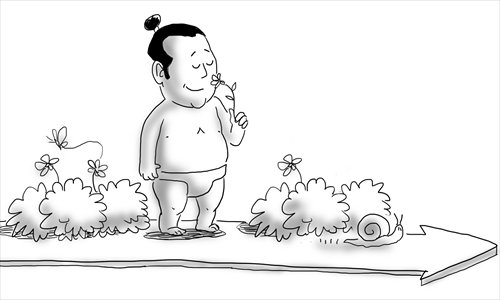HOME >> OP-ED
Economic figures don’t portray real Japan
By Ding Gang Source:Global Times Published: 2016/4/7 0:38:03

Illustration: Liu Rui/GT
The plane arrived at Haneda Airport at noon. I first visited here 15 years ago, and could still vividly remember the garbage cans in the airport and their clear markings on different types of dustbins.
I had worked in Europe and the US for many years at that time and done quite many reports about garbage recycling. But I was still deeply impressed by the tidy, carefully classified and clearly marked dustbins in Japan's airport. The Japanese government established rules for sorting waste as early as in the 1970s.
When the shuttle bus I took from the airport to the hotel passed through the downtown area, there were no traffic jams and only a few pedestrians. Outdoor advertisements and tower cranes were also rare.
The appearance of the biggest metropolis of the world with a population of 38 million, was far beyond what was expected, which naturally reminded me of two words tied to economy: transformation and vitality.
The garbage classification that lasts 40 years, and the orderly operation of the city should be attributed to Japan's successful transformation. But as for Japan's vitality, it lies in the country's population and culture.
I talked with Zhang Yiwu, a professor from Peking University, who was in the same delegation. The topic of population quickly occupied our conversation. Zhang had studied in Japan for years. He told me Japan's present population is just over 120 million, nearly 1 million fewer people than five years ago and the proportion of the aged is increasing. Demographics is often used by scholars as an important barometer to evaluate Japan's economy.
There is also other similar bad news. A few days ago, the Bank of Japan released its quarterly TANKAN business survey, according to which, confidence of large manufacturers had deteriorated sharply in the first quarter and hit a nearly-three-year low.
Economists across the world are deliberating how long the economic stagnation that has plagued the world's third biggest economy for over two decades will last and whether the stimulus policy adopted by Prime Minister Shinzo Abe could reverse the situation.
However, my three-day observation in Japan told me that GDP cannot show another face of Japan. Jiang Feng, a Japan pundit, told me that in China, the window frames of buildings, even newly constructed ones, are always crudely polished and leave burrs unattended. But in Japan, the window frames of even ancient buildings are smoothly burnished. Many details can show how Japan is still more developed than China.
Shi Ding, deputy editor-in-chief of huanqiu.com, cited another piece of data. Japan is home to 40 of the world's top 100 most innovative companies, exceeding the US with 35, according to a 2015 survey by Thomson Reuters.
Aging is also becoming a source of paradoxical growth. Of the over 60,000 kinds of senior citizen products across the world, over 2,000 are sold in the Chinese market, and more than 40,000 in the Japanese market.
When talking about the economy, Lin, who has lived in Japan for 28 years, mentioned four points: Prices have remained stable for over a decade, the wealth gap is not large, housing prices have only increased by a small margin, and despite years of flat incomes and consumption stagnation, the unemployment rate is low.
I visited a small town in the suburbs of Tokyo the third day I came to Japan. I saw tidy residences and a peaceful and quiet life there. Crowds of commuters streamed out of the nearby subway station only during the evening rush hour.
Terrible data about the stagnant economy leads us to believe the Japanese are living in an abyss of misery. But slow growth doesn't equal social despair.
If a country has insisted on classifying garbage for over 40 years, has ensured the smooth flow of traffic, and is not bristling with tower cranes, and if people there breathe in fresh air, have a stable income, live simple but pleasant and well-off lives, and kids have free education, then how should we define its economy?
I am not making a judgment about a country distant from China, but trying to offer an accurate evaluation on a close neighbor separated by only a strip of water. The country is bound to exert positive or negative influences on China during the process of realizing the Chinese Dream.
The author is a senior editor with People's Daily, and currently a senior fellow with the Chongyang Institute for Financial Studies at Renmin University of China.dinggang@globaltimes.com.cn Follow him on Twitter at @dinggangchina
Posted in: Columnists, Viewpoint